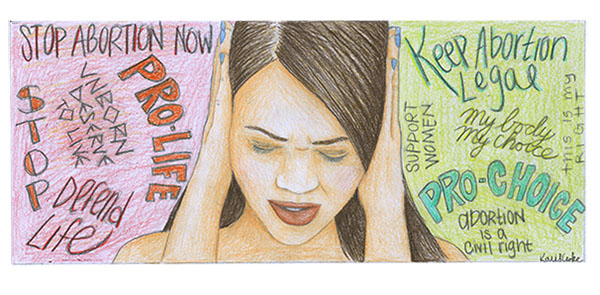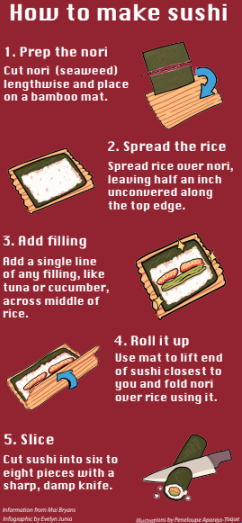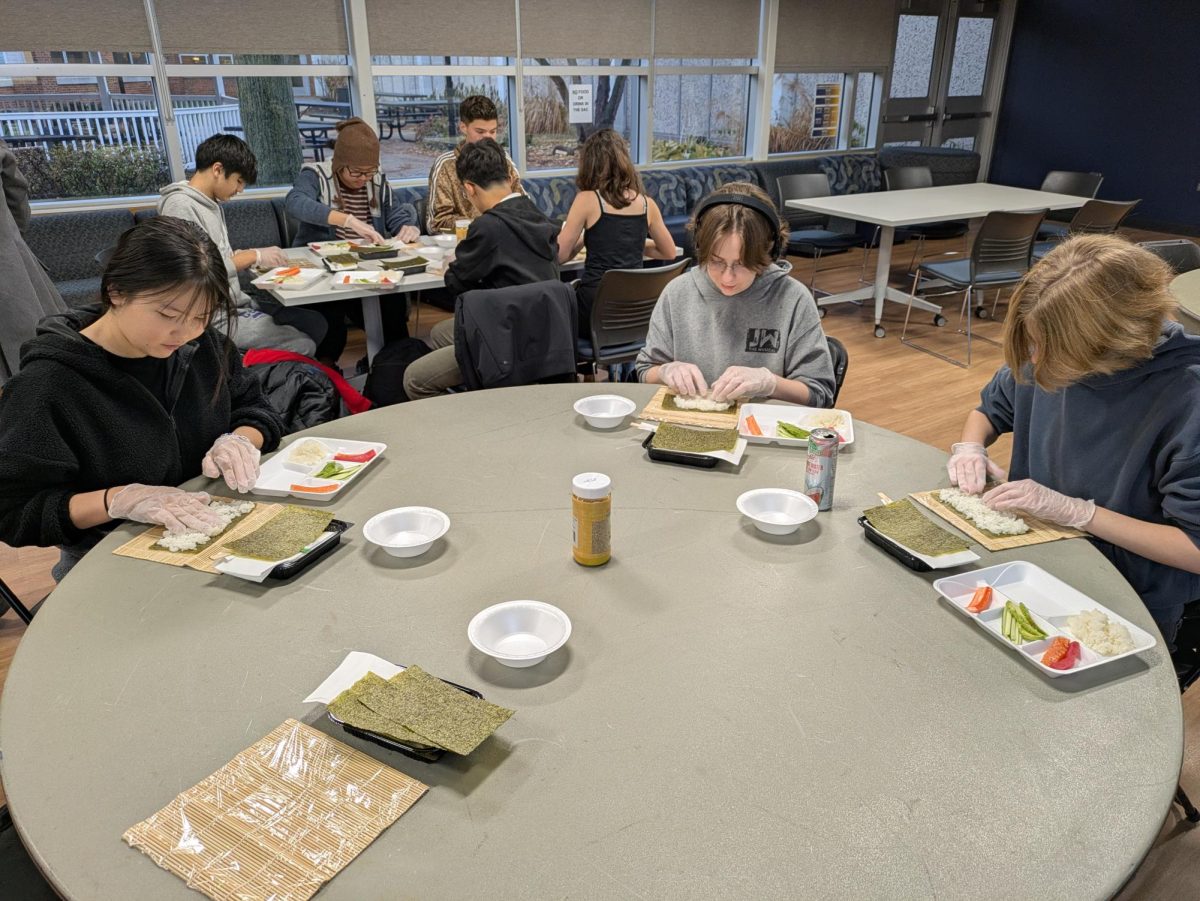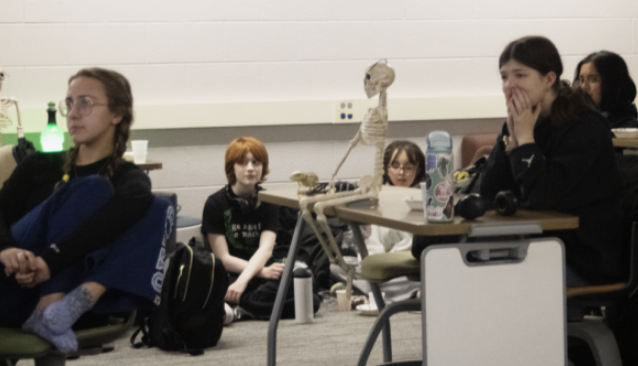“The young of an animal in the womb or egg” is dictionary.com’s definition of a fetus, yet this word has evolved into a greater meaning in the pro-life versus pro-choice debate. This debate originates from people’s beliefs regarding whether or not the government should outlaw abortion. An abortion is the intentional removal of a fetus from the uterus in order to end a pregnancy. Pro-life represents those who are against abortion, and pro-choice represents those who support one’s right to have an abortion. At GBS, students take their stands for the sides they support and participate in this widespread debate.
Pro-Life
Sophomore Rebecca Winiarski learned of the abortion debate from her parents and the news and credits her pro-life stance to her upbringing and the environment in which she was raised.
“I grew up down South, which is [a] much more Christian area, and so we grew up thinking that abortion is wrong because you’re destroying a life,” Winiarski said.
Winiarski emphasized their belief in the immorality of abortion, and Winiarski’s religious inclinations impacted her views morally.
“You’re destroying God’s gift,” Winiarski said. “You’re destroying the very essence of who everyone is;[…] you’re taking upon the role of God, which isn’t what you should be doing, and I think that is just wrong.”
Sophomore Emanuel Martinez, who was also educated about this debate through the news, holds the same opinion as Winiarski that abortion is “just wrong”. Martinez finds that society contradicts itself on its stance on murder when comparing the ideas of killing a person to aborting a fetus.
“When somebody decides to take somebody else’s life knowingly in every civilized society, that [is] frowned upon, so I don’t really understand why abortion is an exception,” Martinez said. “The argument to that is [the fetus is] not able to think; they can’t really do anything for themselves and they don’t have anything that allows them to do anything cognitive. The [counterargument][…] is [neither] does a one hour old baby, and [are you] going to kill a one hour old baby?”
Winiarski recognizes the opinion that the fetus is not self-sustaining and therefore cannot be alive. However, she refuses to accept others’ ideology that the fetus is not human.
“The fetus is human; it is living even though it can’t live on its own,” Winiarski said. “I see how people may think that it’s not human, but it is. It’s a child in there, and whenever it does enter the world, it will have life. It will continue living, and you’re just killing its prospects of living.”
Winiarski knows that there are many opinions on abortion; therefore, she opposes any governmental action made. Despite her pro-life stance, Winiarski acknowledges that some situations necessitate abortion, but she stands firm that others do not.
For example, when the mother does not want to keep the baby, Winiarski, along with Martinez, supports alternatives.
“If you don’t want to keep the child, adoption is certainly an option, and I feel like that’s certainly a better option than just letting a life go,” Martinez said. “There are plenty of people out there in the world that can’t have children[…] and I feel adoption is perfect for that exact situation.”
Martinez admits that his pro-life views are sometimes the unpopular views in this debate. However, he stands firm on his position.
“The majority of people that I talk to have the opposing views to this debate,” Martinez said. “Often times I feel like it’s one versus one hundred, and a lot of times it is. In fact, I just came from a class […] and we were talking about our ideas. I gave mine, and everybody else in that room was pro-choice, so you’re kind of on the losing end per say and having to defend your own topic, but those are your beliefs, so there’s really nobody that can take those away from you.”
Although Winiarski has her own beliefs on this topic, she said that she respects others’ right to their own opinion and will not dictate their positions on the issue.
“I do have a lot of friends [at South] who are on the opposite side of the debate and I respect their views and opinions,” Winiarski said. “I do not force my beliefs down anyone’s throat. I understand people have their own thought process [about] what they think and how they feel, but I do add my say into it and what I think is right.”
Pro-Choice
Senior Marissa Takaki defends females’ freedom to decide. However, she believes there are misconceptions behind the idea.
“If people on the pro-life side are viewing it as ‘if you’re not pro-life then you’re a killer[…],’ [that] isn’t the case, because the pro-choice side doesn’t necessarily mean that you are for or against abortion,” Takaki said.
However, Takaki feels women are not given the choice to which they should be entitled.
“The fact is that most of the people who are in charge of policy-making for [abortion] are men,” Takaki said. “They are not going to have to get the abortion[…]. It’s an argument over women’s rights[…]. It’s the government controlling women’s health rights and I don’t think that’s right at all.”
Senior Josh Konrad believes the mother’s decision is of first priority in the situation and, although he recognizes the dispute surrounding the fetus’s life, he supports the option of abortion nonetheless for the mother’s sake.
“I know [the fetus is] going to be a living thing[…] but I wouldn’t really call it murder, because it hasn’t lived yet,” Konrad said. “It’s [nobody’s] business whether the mom wants to abort the baby or not.”
According to SexInfo Online, which lists arguments from both sides of the debate, pro-life people have asserted, “If the pregnancy is the result of carelessness on the mother’s part (i.e., she did not take the proper precautionary measures[…]), she should have to deal with the consequences. It is ultimately her responsibility (as the partner who can become pregnant) to prevent pregnancy if both she and her male partner do not wish to conceive.”
Takaki questions the blame that is placed on the mother and her supposed faults that the argument states.
“What defines carelessness?” Takaki explained. “Is it[…] if she’s been drinking, if she’s been drugged, if she’s been roofied, if she’s been raped[…] or the birth control didn’t work? That doesn’t necessarily mean she’s been careless.”
Although Takaki recognizes other options like adoption that can relieve the mother of responsibility to the child, Takaki stresses there are other difficulties that surround pregnancy.
“No one should be forced to raise a child if it wasn’t meant to be,” Takaki said. “The people who are getting abortions could be anybody; you don’t know what their background is, what their beliefs are and they might not have a choice in whether they can raise a child or not.”
Konrad tries to sympathize with the female rhetoric behind the debate.
“I’m not a woman, but if I were to be having a child, I think I should be able to decide whether or not I would want that child,” Konrad said.
Takaki also acknowledges religion’s role in the controversy, and despite being religious herself, she asserts the importance of the mother’s decision to choose what they do with their life and body.
While Konrad firmly believes in the woman’s right to an abortion and supports the pro-choice stance in the debate, he remains respectful of pro-life arguments and does not believe in forcing his own ideas onto someone else.
“I can acknowledge that [pro-life believers] make some good points and that they have their right to their own opinion,” Konrad said. “I can’t really say I oppose them because it’s their own opinion. I’m not going to tell them they’re wrong, because it’s their own way of thinking.”








